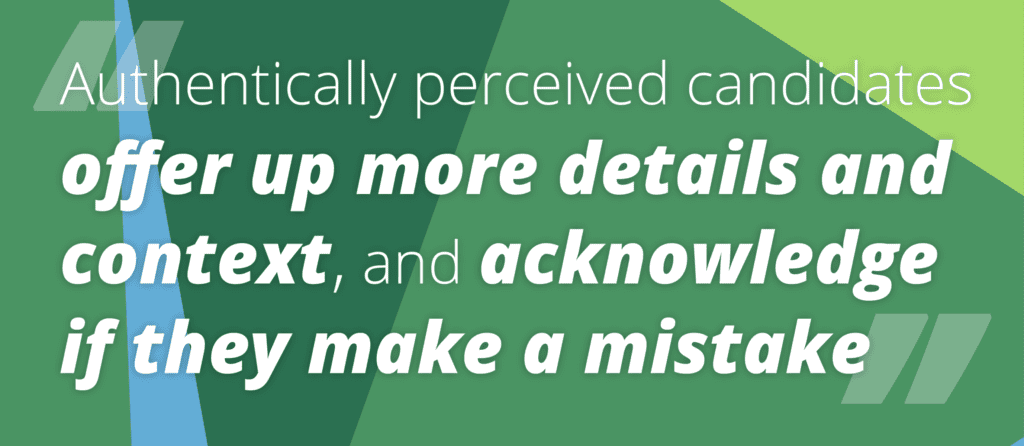Authenticity in the Interview: How To Ace the Big Day

After sending in your resume, trading multiple emails, and possibly a few phone calls, you finally landed that big interview. It’s natural to want to put your very best foot forward. After all, both job seekers and recruiters want the same thing – a mutually beneficial, professional relationship. However, even under the most honest circumstances, candidates can’t help but beef up their resume a bit or puff up some skills because they really want that job opportunity.
While some light embellishment can be expected, overdoing it could backfire for both the job seeker and employer. If a hiring manager glosses over the weaknesses behind a candidate’s resume or skillset, it could hurt them both if the employee can’t meet expectations in a role that likely wasn’t a good fit to begin with. For job seekers, exaggerating a skill or downplaying a weakness may get you the job, but not the job experience you were hoping for. At the end of the day, both sides have the same key thing in common — they want a relationship that stands the test of time.
So how can you ace the interview without selling yourself short? We’re here to break down a few key ways candidates and hiring managers can bring their most authentic self to an interview, ensuring both sides are set up for success long-term.
Job Seekers
Turn your lack of experience into an opportunity to learn.
Showing your willingness to learn and grow will make you a stronger and more authentic candidate. It might be tempting to not mention you lack a skill the hiring manager is looking for, especially if it is specifically asked in an interview. But avoiding the topic could backfire, as it could come out later in the interview process and potentially land you in a position that you are not prepared for. Be honest about your areas of opportunity. If your weakness is a lack of organizational skills, address it head-on to show you’re aware of your deficit but also stress what you are doing to work on it and that you can adopt that company’s processes. This shows that you’re open to working the way they do, making you a good fit for their company. Take it a step further and think about an online class on project management you can take or how you can leverage a new technology to tackle your weakness. Being proactive and taking charge of your growth can go a long way in showing how you strive for continuous improvement and may help put you in contention for the role.

Be prepared with specific examples of your previous job experience.
According to the Wall Street Journal, authentically perceived candidates offer up more details and context, and also acknowledge if they make a mistake. In addition, they tend to have specific information around their job experience ready when asked. One valuable way of demonstrating this is through your resume. By crafting a resume around your specific job experience, you’re setting yourself up for success in the long run. If you state in your interview that you ran a marketing-wide campaign, be honest with your level of involvement and be ready to speak to all aspects of the effort, from planning to execution to how it performed. A good exercise in authenticity to try is: if your resume wasn’t in front of you during an interview, could you speak to each bullet point/aspect extensively?
Be upfront about any potential negative aspects of your job history.
For anyone who has been laid off or let go, dealing with gaps of unemployment can be stressful. If it was due to performance, it can benefit you to be open from the get-go about what happened and emphasize your adaptability and willingness to learn and succeed in your new job. Avoid twisting the truth or shortening the employment gap on your resume — it can cost you the job, as many employers verify dates and lengths of unemployment during your background check. If your layoff was due to downsizing, hiring managers tend to be understanding about it. COVID-19 has impacted the job market and downsizing is now a part of the new normal. Getting ahead of any assumptions by letting them know the situation upfront can only help you in the long run.
Hiring Managers/Recruiters
Do your due diligence before the candidate walks in the door.
Before the candidate steps foot in the interview, make sure you’ve done your homework. Whether you find applicants from referrals, job postings, social media or elsewhere, the fastest way to finding authenticity in candidates is by simply having a conversation with them, whether that’s in person or via video chat. This allows you to read their body language and facial expressions when answering questions, helping you determine whether they are being true to who they are. In addition, make sure you are tailoring your interview questions to the candidate’s resume specifically. That little bit of extra research can go a long way when it comes to understanding the candidate’s skillset on a deeper level.
Address any company weak points upfront.
It’s natural to get excited over a prospective candidate, as it means finally filling that role that is key to helping your team and business succeed. There’s also a psychological element to the act — people want to believe they’re part of something positive. It’s easy even under the sincerest circumstances for hiring managers to gloss over weaknesses in the organization, whether that’s a team working long hours or a lack of culture or diversity initiatives. The best way to stay ahead in an interview is simple – honesty. You don’t need to say “we’ve had culture issues in the past” but you can be upfront about the areas of opportunity and share a concrete plan for how you or the company will address it. And you can tie this back to the candidate too by emphasizing how they can help change the status quo through their contributions.
Be open and honest about why the position is open and whether has there been turnover.
Offering this information up without the candidate having to ask is an opportunity to put them at ease and show your ability to be transparent. The more you can get ahead of these tough questions, the more the candidate feels like they don’t have to pry or bring up potentially uncomfortable questions. Was there recent high job turnover? Or maybe a former team member failed to meet expectations or the job responsibilities changed over time. Let the candidate know, “There has been some turnover, but you have an opportunity to come and change the culture and build something new.” This helps give them context behind the open position and shows the value they can add to your team.
In an age where candidates and hiring managers have never been farther apart, a little authenticity goes a long way. We’re ready to help you get the talent you need to succeed in 2021. Ready to find candidates who are a perfect fit? Start here.




